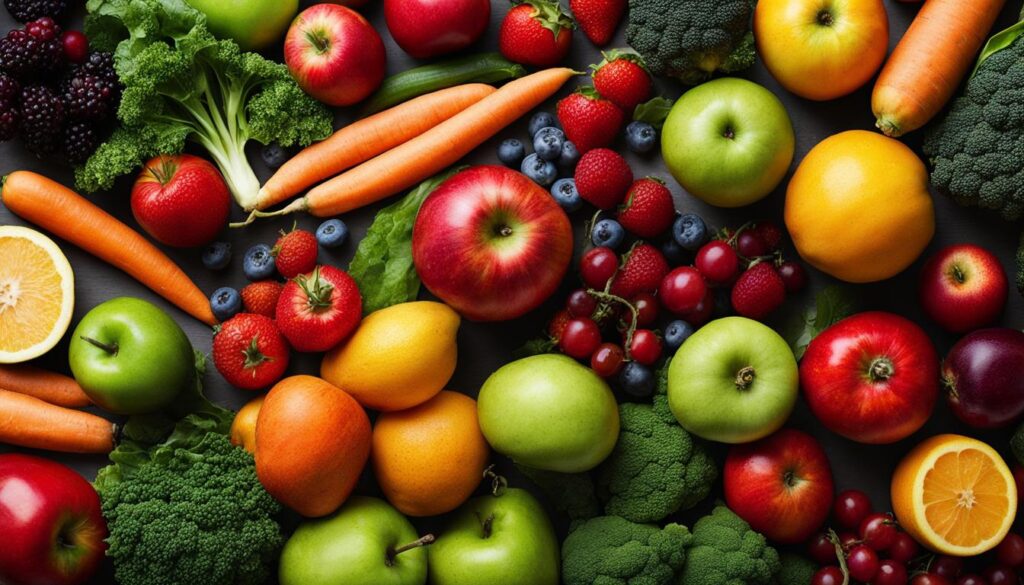Achieving and maintaining a healthy weight is crucial for overall health and well-being. With so much information available, it can be overwhelming to know where to start. In this guide, we will provide you with simple tips and tricks backed by science to help you achieve healthy weight loss. By incorporating these strategies into your lifestyle, you can make sustainable changes and reach your weight loss goals.
Key Takeaways:
- Focus on a healthy diet and regular physical activity to achieve and maintain a healthy weight.
- Mindful eating and enjoying your food can help develop a positive relationship with food.
- Keeping a food and weight diary can provide valuable insights into your eating patterns and progress.
- Incorporate regular physical activity you love into your routine for effective weight loss.
- Choose nutrient-dense foods such as fruits, vegetables, whole grains, and lean proteins.
Eat Mindfully and Enjoy Your Food
In the journey towards healthy weight loss, it’s important to develop a positive relationship with food. Instead of focusing on strict diets or restrictions, try adopting a mindful eating approach and truly enjoy the food you consume. Mindful eating involves paying attention to every bite, savoring the flavors, and being present in the moment. By practicing mindful eating habits, you can improve your overall eating experience and make healthier choices.
Eating mindfully starts with being aware of your body’s hunger and fullness cues. Take the time to listen to your body and eat when you are truly hungry, rather than eating out of boredom or emotional triggers. When you sit down to eat, remove distractions such as phones or televisions, so you can fully focus on your meal. Chew each bite slowly and savor the flavors, appreciating the nourishment the food provides.
Not only does mindful eating enhance the enjoyment of food, but it also helps with portion control. By being present and fully engaged with your meal, you’ll be more likely to recognize when you’re satisfied and avoid overeating. This can contribute to healthy weight loss and a more balanced approach to eating. Remember, the goal is to nourish your body and find pleasure in the food you consume.
The Benefits of Mindful Eating
- Improved digestion: By chewing food thoroughly and eating at a slower pace, you can aid digestion and avoid gastrointestinal discomfort.
- Better food choices: When you’re mindful of what you’re eating, you’re more likely to choose nutrient-dense foods and avoid mindless snacking on unhealthy options.
- Increased satisfaction: Mindful eating allows you to fully appreciate the tastes and textures of your food, leading to a greater sense of satisfaction and enjoyment.
- Reduced stress: Taking the time to savor your meals can help reduce stress levels and improve overall well-being.
“Eating is not only a biological need but also an opportunity to nourish our bodies and find joy in every bite.”
| Eat Mindfully: | Avoid Mindless Eating: |
|---|---|
| Pay attention to your meal: | Avoid eating in front of screens or while multitasking: |
| Savor the flavors and textures of your food: | Don’t eat straight from a bag or container: |
| Chew slowly and thoroughly: | Avoid eating when you’re not hungry: |
| Listen to your body’s hunger and fullness cues: | Find alternative ways to cope with emotions instead of turning to food: |
Keep a Food and Weight Diary
One of the most effective tools for weight loss is keeping a food and weight diary. By documenting everything you eat and tracking your weight regularly, you can gain valuable insights into your eating patterns and progress.
Keeping a food diary involves writing down each meal and snack, including the portion sizes and any additional condiments or toppings. This practice helps you become more aware of your calorie intake and can highlight any unhealthy eating habits or triggers that contribute to weight gain.
In addition to recording your food intake, it’s essential to track your weight regularly. This can be done using a scale, noting any fluctuations and patterns over time. By combining your food diary with weight tracking, you can identify the connection between your eating habits and changes in your weight.
| Date | Meal | Calories |
|---|---|---|
| Jan 1 | Breakfast | 350 |
| Lunch | 500 | |
| Dinner | 450 | |
| Jan 2 | Breakfast | 300 |
| Lunch | 450 | |
| Dinner | 400 |
By tracking your food and weight consistently, you can spot trends and make adjustments to your eating habits. It helps you identify trigger foods that may lead to overeating or emotional eating. You can also make healthier choices by analyzing your food diary and identifying areas where you can improve.
Self-monitoring through a food and weight diary provides a sense of accountability and control over your weight loss journey. It empowers you to take ownership of your choices and make informed decisions about your eating habits. Remember, progress tracking is key to achieving your weight loss goals and maintaining a healthy lifestyle.
Incorporate Regular Physical Activity

Physical activity plays a crucial role in achieving and maintaining healthy weight loss. Regular exercise not only helps burn calories but also improves overall health and well-being. It is recommended to aim for at least 150 minutes of moderate-intensity exercise or 75 minutes of vigorous-intensity exercise per week. Find activities that you enjoy and make them a regular part of your routine. Whether it’s walking, swimming, dancing, or participating in team sports, incorporating regular physical activity into your lifestyle can help you achieve your weight loss goals.
Increased activity levels contribute to weight loss by boosting metabolism, burning stored fat, and building lean muscle mass. It also helps reduce the risk of chronic diseases such as heart disease, diabetes, and certain types of cancer. Physical activity not only benefits your physical health but also improves mood, reduces stress, and enhances mental well-being. It is a holistic approach to weight loss that promotes overall wellness.
To stay motivated and make exercise a habit, consider setting specific goals and tracking your progress. Use a fitness tracker or exercise app to monitor your activity levels and challenge yourself to reach new milestones. Additionally, find a workout buddy or join a fitness class to add social support and accountability to your weight loss journey. Remember, consistency is key when it comes to physical activity, so aim to make it a regular part of your routine for long-term success.
| Improved cardiovascular health | Better weight management | Increase in muscle strength and endurance |
|---|---|---|
| Reduces the risk of heart disease, high blood pressure, and stroke | Helps burn calories and fat | Builds and tones muscles |
| Improves blood circulation and oxygen delivery | Boosts metabolism | Enhances physical performance |
| Increases HDL (good) cholesterol levels | Prevents weight regain after weight loss | Reduces the risk of osteoporosis |
| Decreases LDL (bad) cholesterol levels | Improves insulin sensitivity | Enhances balance and coordination |
“Physical fitness is not only one of the most important keys to a healthy body, but it is also the basis of dynamic and creative intellectual activity.” – John F. Kennedy
Remember to start slowly and gradually increase the intensity of your workouts to avoid injuries. If you have any pre-existing medical conditions or concerns, consult with your healthcare provider before starting a new exercise regimen. Choose activities that align with your interests and abilities, making it more enjoyable and sustainable in the long run. By incorporating regular physical activity into your lifestyle, you can optimize your weight loss efforts and improve your overall health and well-being.
Choose Nutrient-Dense Foods

Eating a variety of nutrient-dense foods is crucial for achieving healthy weight loss. These foods are packed with essential vitamins, minerals, and other beneficial nutrients while being relatively low in calories. By incorporating nutrient-dense choices into your diet, you can nourish your body and support your weight loss goals.
Here are some examples of nutrient-dense foods:
- Fruits and vegetables: Fill your plate with a colorful array of fruits and vegetables. They are rich in fiber, antioxidants, and various vitamins and minerals. Aim to include a variety of different fruits and vegetables in your meals and snacks.
- Whole grains: Opt for whole grains such as quinoa, brown rice, whole wheat bread, and oats. They are higher in fiber and nutrients compared to refined grains, providing sustained energy and promoting feelings of fullness.
- Lean proteins: Choose lean sources of protein such as skinless poultry, fish, tofu, and legumes. These options are lower in saturated fat and calories while providing essential amino acids necessary for muscle repair and growth.
By prioritizing these nutrient-dense foods, you can ensure that your body receives the necessary nutrients while cutting back on empty calories. Combine them in balanced meals to create a satisfying and nourishing eating plan.
Eating Plan Example:
| Meal | Example |
|---|---|
| Breakfast | Scrambled eggs with spinach, whole grain toast, and a side of mixed berries |
| Lunch | Grilled chicken salad with mixed greens, cherry tomatoes, cucumber, and quinoa |
| Snack | Carrot sticks with hummus |
| Dinner | Baked salmon with roasted sweet potatoes and steamed broccoli |
| Snack | A small handful of mixed nuts and a piece of fruit |
Remember to listen to your body’s hunger and fullness cues and eat in moderation. Choosing nutrient-dense foods not only supports healthy weight loss but also promotes overall well-being and optimal nutrition.
Practice Portion Control

When it comes to achieving healthy weight loss, practicing portion control is crucial. By being mindful of your serving sizes and making conscious choices about the amount of food you consume, you can create a balanced and nutritious diet that supports your weight loss goals. Portion control allows you to enjoy a variety of foods while still managing your calorie intake and promoting mindful eating habits.
One effective way to practice portion control is by using measuring cups and portion control tools. These tools can help you understand and visualize appropriate serving sizes, ensuring that you are not eating more than your body needs. By becoming familiar with serving sizes, you can make informed decisions about the amount of food to include on your plate.
Another helpful strategy for portion control is to eat balanced meals that incorporate a variety of nutrient-dense foods. Aim to include a combination of fruits, vegetables, whole grains, and lean proteins in each meal. This not only ensures that you are getting a wide range of essential nutrients but also helps you feel satisfied and energized throughout the day.
The Importance of Mindful Eating
Mindful eating goes hand in hand with portion control and can significantly impact your weight loss journey. By paying attention to your body’s hunger and fullness cues, you can avoid overeating and better understand your body’s needs. Take the time to savor each bite, chew slowly, and truly appreciate the flavors and textures of the food you are eating.
Engaging in mindful eating can also help you identify emotional and mindless eating patterns. By being present in the moment and actively listening to your body’s signals, you can make conscious decisions about when to eat and when to stop, rather than relying on external cues or emotional triggers.
Remember, practicing portion control and mindful eating is a lifelong habit that contributes to overall health and well-being. It allows you to enjoy food in a balanced and sustainable way while still working towards your weight loss goals.
Stay Hydrated and Avoid Liquid Calories

Staying hydrated is a crucial component of maintaining a healthy weight. Not only does proper hydration support overall health, but it can also aid in weight loss. Drinking an adequate amount of water throughout the day helps to keep you feeling full and satisfied, reducing the likelihood of overeating. It also assists in optimizing your body’s natural metabolic processes, allowing for more efficient digestion and calorie burning.
To ensure you are staying properly hydrated, aim to drink at least eight 8-ounce glasses of water daily. It’s important to note that individual water needs may vary based on factors such as activity level, climate, and overall health. Additionally, incorporating calorie-free beverages into your hydration routine can add variety without adding unnecessary calories. Herbal tea and infused water are excellent choices to quench your thirst while avoiding liquid calories.
On the other hand, it’s crucial to limit or even avoid sugary drinks as they can contribute to weight gain. These beverages, such as soda, energy drinks, or sweetened juices, are often high in calories and low in nutritional value. By cutting back on sugary drinks, you can significantly reduce your daily calorie intake and support your weight loss efforts.
Manage Stress and Emotional Eating

Stress is a common factor in our lives, and it can often lead to emotional eating. When we’re stressed, our body releases hormones that can increase hunger and cravings for high-calorie comfort foods. To achieve healthy weight loss, it’s essential to manage stress and develop healthy coping mechanisms.
One effective way to manage stress is through regular exercise, which can help reduce stress levels and improve mood. Engaging in activities like yoga, meditation, or deep breathing exercises can also promote relaxation and reduce emotional eating triggers.
Another helpful strategy is to find alternative ways to cope with stress besides turning to food. This can include activities such as journaling, listening to music, spending time in nature, or talking to a supportive friend or family member. By finding healthy outlets for stress, we can minimize the urge to reach for unhealthy comfort foods.
“Stress is not what happens to us. It’s our response to what happens. And the response is something we can choose.” – Maureen Killoran
Understanding Stress and Hunger
It’s important to recognize the connection between stress and hunger. When we’re under stress, our body’s stress response can trigger cravings for calorie-dense foods. These foods often provide temporary relief from stress but can lead to weight gain and further stress in the long run.
By managing stress and finding healthier ways to cope, we can break the cycle of emotional eating. It’s crucial to address the underlying causes of stress and develop a toolbox of coping mechanisms that will support our weight loss goals and overall well-being.
| Healthy Coping Mechanisms | Unhealthy Coping Mechanisms |
|---|---|
| Exercising regularly | Turning to comfort foods |
| Practicing mindfulness and meditation | Using food as a way to numb emotions |
| Engaging in hobbies or activities that bring joy | Binge eating or emotional overeating |
| Seeking support from friends, family, or a therapist | Isolating oneself and avoiding social connections |
Sleep and Its Impact on Weight Loss

Adequate sleep is a crucial aspect of a successful weight loss journey. Quality sleep plays a significant role in regulating hunger hormones, managing cravings, and supporting healthy metabolism.
When we don’t get enough sleep, it can lead to an imbalance in our hunger hormones, ghrelin and leptin. Ghrelin, the hormone that stimulates appetite, increases when we are sleep-deprived, making us more prone to overeating and cravings. On the other hand, leptin, the hormone that signals fullness, decreases, leading to a decreased feeling of satisfaction after meals.
Studies have shown that sleep deprivation can also affect our overall food choices. When we are tired, we tend to reach for high-calorie, salty, and sugary foods in an attempt to gain quick energy. These unhealthy food choices can hinder our weight loss progress and contribute to weight gain over time.
| Sleep Quality Recommendations: | Benefits: |
|---|---|
| Aim for 7-9 hours of quality sleep per night | Proper regulation of hunger hormones |
| Create a sleep-friendly environment | Improved mood and mental clarity |
| Establish a bedtime routine | Increased energy and productivity |
Make sleep a priority in your weight loss journey. Establishing consistent sleep patterns, creating a comfortable sleep environment, and adopting relaxation techniques can all contribute to better sleep quality and support your efforts to achieve a healthy weight.
Social Support and Accountability: Keys to Successful Weight Loss
Embarking on a weight loss journey can be challenging, but you don’t have to go it alone. Seeking social support and accountability can significantly increase your chances of success. Surrounding yourself with a supportive community, whether it’s friends, family, or a weight loss support group, can provide motivation, encouragement, and practical tips to help you stay on track.
When you have a strong support system, you have a network of people who understand the struggles you may face and can offer guidance and empathy. Connecting with others who are also focused on weight loss allows you to share experiences, learn from one another, and offer mutual support. This sense of belonging and shared goal can boost your motivation and keep you accountable to your weight loss journey.
- Joining a weight loss support group can provide a safe space to discuss your challenges, celebrate your successes, and gain valuable insights from others who are on a similar path.
- Engaging in online weight loss communities or forums can offer a virtual support network, where you can connect with like-minded individuals, ask questions, and share your progress.
- Enlisting the support of friends and family members can also make a significant difference. Let them know about your weight loss goals, and they can provide encouragement, offer healthy recipe ideas, or even be a workout buddy.
Remember, support and accountability go hand in hand. By surrounding yourself with individuals who understand your goals and are invested in your success, you’ll have the encouragement and motivation you need to stay committed to your healthy weight loss journey.
| Benefits of Social Support and Accountability |
|---|
| • Increased motivation and encouragement |
| • Practical tips and advice from others with similar goals |
| • Feeling understood and less alone in your weight loss journey |
| • Opportunity to learn from the experiences of others |
| • Sense of accountability to stay on track with your goals |
Remember, seeking social support and accountability doesn’t mean you’re weak or incapable of achieving your goals on your own. It’s quite the opposite – it shows strength and a commitment to your well-being. So don’t hesitate to reach out to others, join a support group, or lean on your loved ones for support. Together, you can celebrate milestones, overcome obstacles, and ultimately achieve your weight loss goals.
Setting Realistic Goals and Maintaining a Positive Mindset
When embarking on a weight loss journey, it’s important to set realistic goals that align with your long-term objectives. Instead of focusing solely on the number on the scale, consider other factors such as improved energy levels, better sleep, and increased overall well-being. By setting achievable targets, you can stay motivated and track your progress effectively.
Having a positive mindset is crucial for sustainable weight loss. Instead of dwelling on setbacks or perceived failures, focus on the progress you’ve made and celebrate even the smallest victories. Remember, lasting change takes time, and setbacks are inevitable. By maintaining a positive attitude, you can overcome obstacles and stay committed to your goals.
In addition to goal setting and a positive mindset, motivation plays a key role in achieving healthy weight loss. Find what motivates you, whether it’s visualizing your desired outcome, rewarding yourself for milestone achievements, or seeking support from loved ones. Cultivating sustained motivation will make your weight loss journey more enjoyable and successful.
By setting realistic goals, maintaining a positive mindset, and finding motivation, you can embark on a healthy weight loss journey that is not only effective but also sustainable in the long run.
Conclusion
Achieving and maintaining a healthy weight requires a combination of healthy eating, regular physical activity, and adopting a positive mindset. By implementing the tips and strategies outlined in this guide, you can make sustainable changes to your lifestyle and achieve your weight loss goals. Remember to be patient with yourself, celebrate your progress, and focus on long-term success rather than quick fixes. Here’s to a healthier and happier you!
When it comes to healthy weight loss, it’s important to prioritize sustainable practices. Crash diets and extreme measures may yield short-term results, but they are unlikely to lead to long-term success. Instead, focus on making gradual, realistic changes to your eating habits and incorporating regular physical activity into your routine.
Remember that healthy weight loss is a journey, and everyone’s path is unique. Be kind to yourself and stay positive throughout the process. Celebrate your achievements along the way, whether they’re big or small. By adopting a sustainable approach to your weight loss journey, you’ll not only achieve a healthier weight but also improve your overall well-being in the long run.
Also Refer : Hеalthy Eating: A Guidе to Nourishing Your Body and Mind
FAQs
Q: How can I achieve healthy weight loss?
A: Healthy weight loss can be achieved by adopting a balanced diet, incorporating regular physical activity, and making sustainable lifestyle changes help you lose weight overweight obese type 2 diabetes.
Q: What are some simple tips for losing weight?
A: Some simple tips for losing weight include eating slowly, avoiding processed foods, practicing meal planning, and reading food labels to make informed choices healthy fats want to lose weight diet and exercise lose weight and keep tips to help you lose.
Q: What is the importance of healthy eating in weight loss?
A: Healthy eating is crucial for weight lose 1 as it provides essential nutrients way to lose weight in the long harvard health, helps control portion sizes, and supports overall well-being and energy levels way to lose weight-loss.
Q: How can I lose weight the healthy way?
A: To lose weight the healthy way, it’s important to focus on a balanced diet, portion control, and regular exercise while avoiding extreme or fad diets body weight loss plan days of the week food and nutrition.
Q: How does obesity impact weight loss?
A: Obesity can pose challenges for weight loss due to factors such as hormonal imbalances, metabolic changes, and increased risk of certain health conditions trying to lose weight body fat certain foods front of the tv.
Q: What role does diet play in weight loss?
A: Diet plays a crucial role in weight loss by influencing calorie intake, metabolism, and the body’s ability to burn fat, making it essential for achieving and maintaining a healthy weight.
Q: What are some effective strategies for maintaining weight loss?
A: Effective strategies for maintaining comes to weight loss include staying physically active, practicing mindful eating, seeking support from others, and monitoring food intake and exercise habits.
Q: How can I make sustainable changes in my lifestyle for weight loss?
A: To make sustainable changes for diet for weight loss, focus on gradual, long-term adjustments in dietary habits, physical activity, stress management, and self-care routines.
Q: What are some science-backed tips for achieving healthy weight loss?
A: Science-backed tips for healthy weight loss include focusing on whole, nutrient-dense foods, incorporating regular cardio and strength training, and seeking professional guidance when needed.
Q: How can I reach my healthy weight and maintain it?
A: To reach a healthy weight and maintain it, aim for a balanced lifestyle that includes nutritious eating, consistent physical activity, adequate sleep, and ongoing self-awareness.













